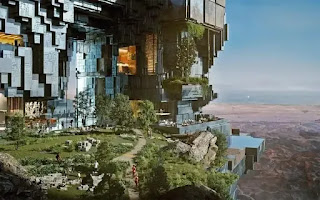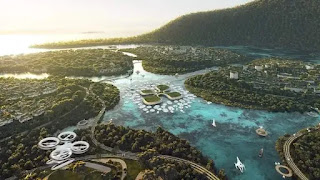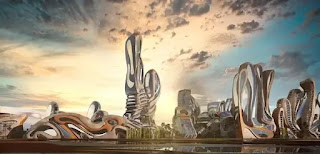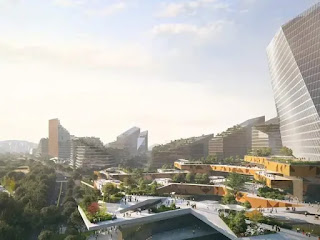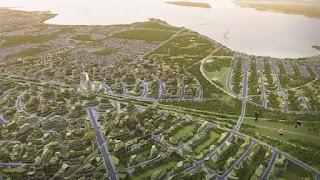Smart Cities Are Being Built In Different Parts Of The World
10 Smart City Into The Future:
- The Line, Saudi Arabia
- Telosa, United States
- Biodiver City, Malaysia
- Floating City, Maldives
- Acon City, Senegal
- Smart Forest City, Mexico
- New administrative capital, Egypt
- Net City, China
- The Orbit, Canada
- Oceanics Busan, South Korea
People from different civilizations in the past have tried to build cities efficiently according to plans. They aim to ensure that every useful facility like the city's roads, houses, shops or communication systems can meet the needs of the city dwellers.
Even in modern times, people have planned cities for the same purpose. Many things like electricity, internet or gas connection have been considered during city planning. But lately the need to use new technologies while planning the city has increased a lot. Various speculations are going on about what will be the image of our city in this era of the fourth industrial revolution. As a result, the concept of technology-driven smart cities of the future has come up for discussion in the last decade.
Basically, Smart City will work to provide better quality services to city dwellers using information technology. Different types of sensors and devices will be used in the smart city to meet people's daily needs efficiently in less time. Necessary changes will be made in all types of infrastructure and communication systems of the city using the information obtained from these devices.
Information or data will be used to improve all systems of a smart city, including transportation systems, power generation, utilities, waste management, sewerage, crime investigation, schools, libraries or hospitals. Along with achieving economic growth of the city, the main goal of establishing a smart city will be to improve the quality of life of the people over time.
Today, 4.4 billion people live in cities, which is 56% of the world's total population. It is estimated that by 2050, 7 out of 10 people will live in cities. There will be no alternative to the use of technology to meet all the daily needs of this large number of urban dwellers. Apart from this, it will be necessary to build a smart city to manage all activities of the city in an environmentally friendly way.
In Smart City, city dwellers can avail many types of services with simple devices like mobile phones. Again, the electricity needs of the smart city will be met from environmentally friendly sources. Through the 'smart grid' in such cities, electricity can be distributed among the people according to their needs. Moreover, there will be many things like 'smart home', 'bicycle sharing system' or 'digital library' in the future smart city.
So far, many initiatives have been taken by the Southeast Asian Association of Southeast Asian Nations (ASEAN) or alliances like the European Union and many countries like Singapore and China to build smart cities. In addition, American companies such as IBM, Cisco, Microsoft and Google, Europe's Slider Electronic, China's Baidu, Alibaba, Tencent and Huawei are working on commercial smart city construction and planning.
In addition, a special project has been undertaken for research on smart cities at the 'Swiss Federal Institute of Technology Lausanne' located in Switzerland. A special 'Smart City Lab' has been set up for research on smart cities at MIT in the United States. Besides Greece, Israel and several countries in Europe, large-scale research is being done on smart cities.
Such technology has already been used in several cities of different countries around the world, which will play an important role in the smart city that will be built in the future. Different types of technology have been used in cities such as Taipei in Taiwan, Ispahan in Iran, Songdo in South Korea, Brisbane in Australia or Columbus in the US state of Ohio.
However, no smart city has been planned from scratch. However, in the near future, we will see multiple smart cities being built in different countries of the world. Many of these cities have been named and planned. Let's take a look at these 10 cities one by one.
1. The Line, Saudi Arabia
The Line, Saudi Arabia
This smart city will be built along a straight line 170 km long, with a total area of 34 square km. Long and long, two mirror-like buildings will extend on both sides of this city. Both buildings will be 200 meters or 660 feet wide and 500 meters or 1,600 feet tall. The city will have 3 levels vertically.
The upper level will be for pedestrians, below it will be various types of infrastructure and the lower level will have the transport system. Artificial intelligence or AI will be in charge of supervising this city.
AI will work with different types of data from various sources in cities to improve the daily lives of citizens. At the individual level, citizens will be paid in return for sharing data with the city's central system. It will cost 500 billion dollars to build the line. And 9 million or 9 million people can live in this city. The construction work of this smart city project started last year, i.e. in October 2022. And the first phase of construction of this city will be completed by 2000.
This image depicts the artist's imagination of how a part of the city will look like after the construction of The Line is completed.
2. Telosa, United States
Telosa, United States
By 2050, this smart city named Telosa will be home to 5 million people. However, 50,000 people will be able to start living here once the first phase of construction is completed. Exactly where this city will be built is yet to be determined. However, the city is planned to be built somewhere in Utah, Idaho, Nevada, Arizona, Texas or Appalachia.
The responsibility of planning this city has been given to a Danish architectural firm named 'Bierke Ingles Group'. Telosa is being planned as a '15-minute city', where residents will have work, schools and basic amenities within 15 minutes of their homes. The picture shows what Telosa city center might look like.
3. Biodiver City, Malaysia
Biodiver City, Malaysia
This smart city will be built with 3 districts. Each district will again have 6 to 8 artificial islands. And each district can accommodate 15,000 to 18,000 people. Again 3 districts will have 3 objectives. One district will be used for technology, another district will be a commercial area and the third will be used primarily for residential purposes.
The islands within the district will be connected by an automated transport system. These automated transportation systems will range from land vehicles to watercraft and airships. The project, with a total area of 1,821 hectares, will have 4.6 kilometers of beaches, 242 hectares of parks and 25 kilometers of direct sea views.
The electricity needs of this smart city will be met with electricity from renewable sources. Besides, its waste management will also be managed in an environmentally friendly way. 'BioDiver City as it will look from the sky after the completion of the construction, is artificially enhanced in the picture.
4. Floating City, Maldives
Floating City, Maldives
The smart city will have around 5,000 separate floating parts. And these parts will have various facilities like houses, restaurants, shops and schools. A water body like a canal will flow between these different floating parts.
The smart city will be built in a joint venture between Dutch Docklands, a Dutch developer and the Maldivian government. It is hoped that the floating city will be able to cope with the problem of rising sea levels due to climate change.
All the facilities required for the floating city will be built at the local shipyard. The Maldivian government claims that 20,000 people can start living in this city within the next 5 years. The floating city, surrounded by artificial coral reefs, will look a lot like this picture from the sky.
5. Acon City, Senegal
Acon City, Senegal
The city has plans to use various modern technologies like blockchain. There will also be a university, 5,000-bed hospital, technology centre, oceanfront 'Ocean Resort', offices and parks. There will be multiple skyscrapers or skyscrapers. Los Angeles-based KE International and Dubai-based Bakri & Associates Development Consultants will work together to build this smart city.
Like other smart cities, this 800 hectare or 2,000 acre city will meet its needs with electricity from renewable sources. The primary objective of the project is to boost the local economy and create employment for the local people. If constructed according to the current plan, Akon City's facilities will look like the picture.
6. Smart Forest City, Mexico
Smart Forest City, Mexico
Apart from humans, the city will be home to 7.5 million plants of 400 species. Among these plants, the number of trees will be 260,000. Water will be given to these plants through a special underground irrigation system. This irrigation system connected to the sea will work through a special 'desalination plant'. The plant will separate the salt from the salty sea water. As a result, the city dwellers can use this water.
Forest City will have a campus made with advanced technology, where different universities, institutes or research institutes of the world can work. All vehicles in this city will be electric. The image of this city from the sky will be somewhat like a photo.
7. New administrative capital, Egypt
New administrative capital, Egypt
Apart from various administrative buildings, there are more than 30 large skyscrapers, central parks, artificial lakes, about 2,000 educational institutions, technology and innovative research parks, 663 hospitals and clinics, 1,250 mosques and churches, and 93,440 There will be a stadium with seats.
The world's tallest building Obelisco Capital will be built in this smart city. The building will be 1,000 meters tall when inaugurated in 2030.
Egypt's new capital has yet to be named. A competition to create a name and logo for the city was launched on the new capital's website. However, the results of the competition have not been declared yet. In 2021, Egypt's Minister of Communications said that the city could be named after the country. The picture shows a part of this city under construction.
8. Net City, China
Net City, China
The US architectural firm 'NBBJ' has planned this city. According to Swapati, efforts will be made to keep the number of private vehicles as low as possible in the city. For this, special roads will be constructed in this city, where only vehicles like buses and bicycles can move.
Also, enough solar panels will be installed on the roof of the facility to harness solar energy. And special measures will be put in place in the city to reuse the waste water used by the citizens through purification. This smart city will have buildings of different sizes ranging from 1 to 30 dollars on average. An imaginary scene of what these buildings inside the city will look like is seen in the picture.
Japanese car maker Toyota is building cities with institutional initiatives like Tencent. The name of this smart city to be built at the foot of Japan's famous Mount Fuji is 'Woven City', which will have an area of 175 acres. *Inhabitants of the Woven City will use many modern technologies such as automated cars and robots.
9. The Orbit, Canada
The Orbit, Canada
Again there will be a huge system of fiber optic cables to ensure internet service across the city. Through this system, internet connection will be provided to all buildings including sidewalks or roads. The city will also have a special 'drone port' to be used as a port for drone vehicles.
'Orbit' is being designed by Canada's Toronto-based architecture firm 'Partisan'. The picture shows how this smart city will look like from the sky.
10. Oceanics Busan, South Korea
Oceanics Busan, South Korea
The city will be built by Oceanix, a New York-based technology company working on floating structures. And the 'UN-Habitat' or 'United Nations Human Settlements Program' will help build the city. Also, the construction of the city will be done by 'Biake Ingalls Group' and 'Samu Architects and Engineers', a firm of Samsung Group. Basically, it will be possible to deal with the problem of rising sea level due to climate change through the construction of such cities. At least that's what the makers hope.
Top 28 Facts About "10 Smart Cities Being Built Around The World: A Look Into The Future"
- The Line, Saudi Arabia
- Telosa, United States
- Biodiver City, Malaysia
- Floating City, Maldives
- Acon City, Senegal
- Smart Forest City, Mexico
- New administrative capital, Egypt
- Net City, China
- The Orbit, Canada
- Oceanics Busan, South Korea
Top 28 Facts:
- The floating city will be divided into 3 parts, with a total area of 15.5 acres. It can accommodate about 12,000 people. Hydroponic farming will be done in water to maintain the food supply of the city people.
- Also, facilities will be built for various types of research. It is expected that the construction of the first phase of this city will be completed by 2026. The image shows a fictional view of the city with all the floating structures.
- The Line, a new city in Saudi Arabia, is planned to be a 170-kilometer-long linear city without cars and roads, powered by renewable energy and artificial intelligence.
- Telosa, a planned city in the United States, aims to be a sustainable and equitable city with a focus on innovation and technology, founded by billionaire entrepreneur Marc Lore.
- Biodiver City in Malaysia is being built to be a sustainable city that prioritizes the preservation of natural habitats and biodiversity.
- The Floating City in the Maldives is being built to be a self-sufficient city on a floating platform, powered by renewable energy and designed to withstand rising sea levels.
- Acon City in Senegal is being built to be a high-tech city with a focus on renewable energy, education, and job creation.
- Smart Forest City in Mexico is a planned city that aims to be a green city with a focus on sustainability, biodiversity, and self-sufficiency.
- The New Administrative Capital in Egypt is a planned city that aims to be a smart city with a focus on technology, sustainability, and modernity.
- Net City in China is a planned city that aims to be a smart city with a focus on connectivity, innovation, and sustainability.
- The Orbit in Canada is a planned city that aims to be a smart and sustainable city with a focus on community, connectivity, and innovation.
- Oceanics Busan in South Korea is a planned city that aims to be a sustainable city with a focus on ocean conservation, renewable energy, and green transportation.
- The Line in Saudi Arabia is expected to house a million people and cost $500 billion to build.
- Telosa is expected to house 5 million people and cost $400 billion to build.
- Biodiver City is being built on a 486-acre site and is expected to be completed by 2030.
- The Floating City in the Maldives is expected to house 10,000 residents and cost $500 million to build.
- Acon City in Senegal is being built on a 2,000-acre site and is expected to be completed by 2035.
- Smart Forest City in Mexico is being built on a 557-acre site and is expected to be completed by 2025.
- The New Administrative Capital in Egypt is being built on a 170,000-acre site and is expected to house 6.5 million people.
- Net City in China is being built on a 100-acre site and is expected to be completed by 2025.
- The Orbit in Canada is being built on a 1,150-acre site and is expected to be completed by 2030.
- Oceanics Busan in South Korea is being built on a 1,500-acre site and is expected to be completed by 2030.
- The Line in Saudi Arabia is planned to have no roads or cars and will rely on ultra-high-speed transportation and autonomous vehicles.
- Telosa is planned to have a green belt around the city, creating a 15-minute city model where everything is within a 15-minute walk.
- Biodiver City in Malaysia is planned to have a wildlife corridor that connects the city to nearby forests, promoting biodiversity.
- The Floating City in the Maldives is planned to be completely self-sufficient, using solar and wave energy to power the city.
- Acon City in Senegal is planned to have a technology hub, a university, a research center, and a hospital.
- Smart Forest City in Mexico is planned to be powered by solar and geothermal energy, and will feature a central park with over 7 million plants.
Discover the top 10 smart cities being built around the world and catch a glimpse into the future of urban living. Explore The Line in Saudi Arabia, Telosa in the United States, Biodiver City in Malaysia, The Floating City in the Maldives, Acon City in Senegal, Smart Forest City in Mexico, New Administrative Capital in Egypt, Net City in China, The Orbit in Canada, and Oceanics Busan in South Korea. These cities are designed to optimize resources, reduce carbon footprints, and enhance quality of life for their inhabitants through innovative solutions and sustainable practices. Immerse yourself in the visionary urban planning of these smart cities and envision the possibilities for the cities of tomorrow.


